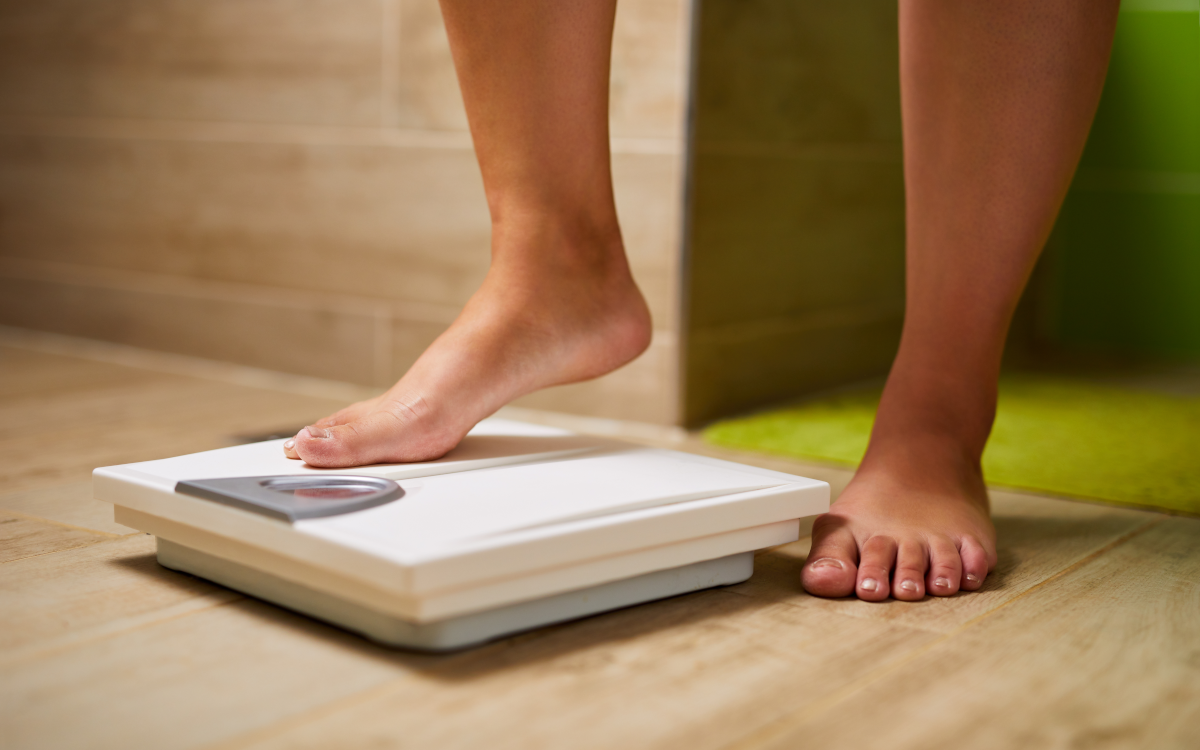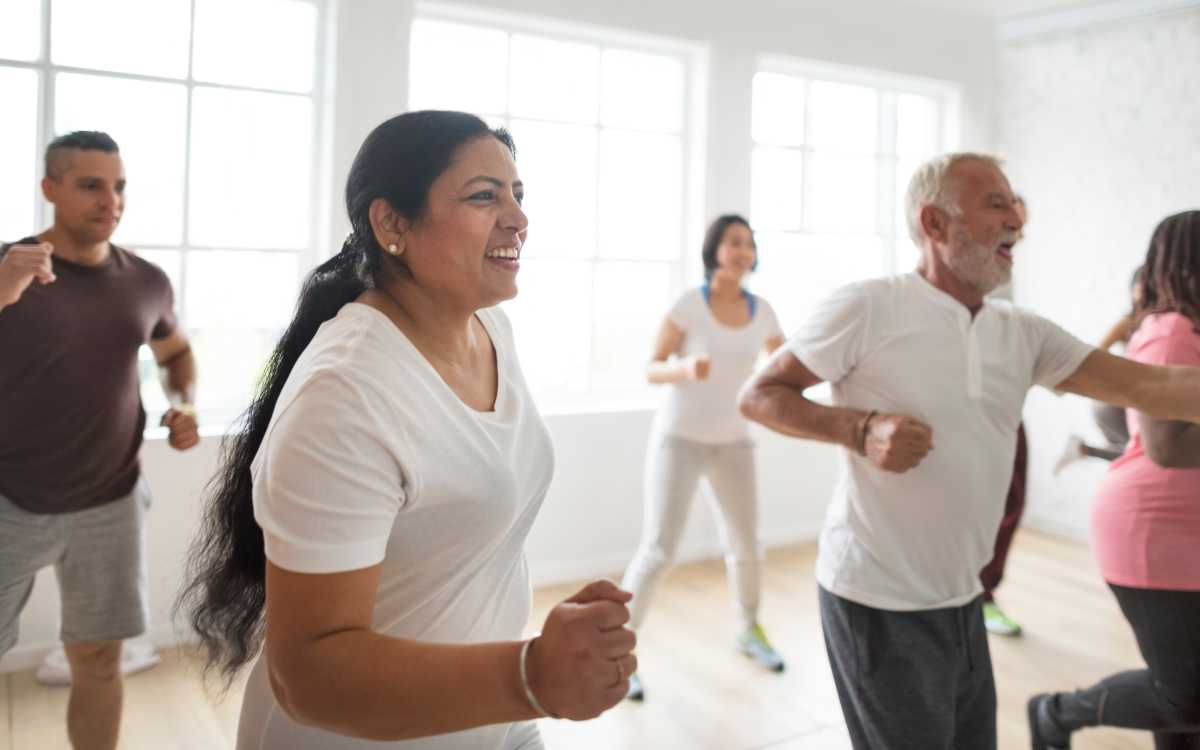What you'll learn here |
Losing weight can be a real challenge—and it doesn’t get any easier with age. Why? Well, because the aging process brings many factors that can disrupt the weight loss journey more than in your younger years.
The natural aging process is partly to blame. But there are other factors that come into play, like our lifestyle, eating patterns, and general levels of movement.
Added weight gain can also cause both physical and mental health issues, which can spiral if something isn’t done about it.
The good news is that you can do something about it. Armed with the right tools and advice, you can turn the tide by removing many of the obstacles in your way.
No weight loss effort can be described as easy, but it can certainly be a lot more enjoyable. It can also go a lot more smoothly—age aside—if you know what you’re doing.
You’ve got this.
Why is it harder to lose weight after 40?

As you get older, the realities of the aging process can creep in. You don’t feel as energetic as you once did, your appetite for socializing can start to wane, and shifting the pounds can become a struggle.
There are several reasons why you tend to put on weight more readily after the age of 40. Here are some of the biggest factors…
- You don’t need as many calories due to less physical movement
- You have a busier life and don’t have time to think about healthy meals
- You have less time and a lower interest in physical activity
- Your hormones change and affect muscle and fat storage
- Your stress levels are higher due to family or work pressures
As you get older, your body requires fewer calories, so if you're still eating as you did in your earlier years, you’re likely to pack on the pounds.
According to government dietary guidelines, the average person in their 40s is likely to need 200 calories less per day than they did in their 30s.
This may seem like a small amount, but overeating by this would equate to 1,400 calories each week and quickly lead to noticeable weight gain.
The good news is: You can make practical changes so that losing weight after 40 becomes easier and more achievable.
Read: Sneaky ways to burn calories throughout your day
How to lose weight after 40: top tips and insider advice

One of the hardest parts of trying to lose weight, especially, when you are older, is knowing where to start. But don’t sweat it—we’ve got you covered.
A few changes here and there can make a big difference. Even a few minor adjustments to your daily lifestyle can set you on the right path to weight loss. Turning these small changes into habits will make a significant difference to your weight management.
Let’s look at the key areas right now.
Diet
Enjoying a balanced diet that covers all the essential nutrients you need to get through your daily life is important. But the trick is not to consume too many calories.
When you were younger you might have got away with eating anything. But as you age, your body becomes less forgiving. Any bad habits you pick up related to fast food or sugary snacks tend to come back to haunt you. So, to lose weight the healthy way, it’s important to take a look at your diet and make some healthy changes.
The first thing you should do is cut down on highly processed and junk food and replace it with a lip-smacking mix of whole foods. Plenty of fruit and vegetables are essential for keeping the nutrients high and the calories low.
Here are some simple tricks to help you on your way…
- Eat more vegetables: They’ll keep you full and supply plenty of vitamins, minerals, and fiber.
- Consume lean protein: This helps your body to maintain muscle mass and stay lean.
- Cut out sugary drinks: These kinds of drinks are full of empty calories and can make you look bloated.
- Add healthy fats to your diet: Choose foods with ‘good’ unsaturated, healthy fats such as vegetable oils (such as olive, canola, sunflower, soy, and corn), nuts, seeds, and fish.
- Choose complex carbs: These energy-boosting goodies include oats and brown rice instead of pasta or sugary cereals.
- Avoid crash dieting: Fad diets can leave you feeling fatigued and can damage your health. Steer clear!
- Reduce your portion sizes: This will help you with your overall calorie control.
- Take a supplement: Low levels of some vitamins can hinder weight loss for those over 40, making it harder to shift fat no matter how well you’re doing everything else. Taking a supplement which contains a range of B vitamins will give you an added boost in your weight loss efforts. B vitamins have been shown to boost metabolism and help with weight management.
You don’t need to go into a huge calorie deficit to lose weight. Eating healthily and avoiding high-calorie snacks will keep you on track and help keep you well. If you can get this part right, it will set you up nicely for the calorie burn.
Exercise
Combining a healthy diet with regular exercise is the most effective way to lose weight at any age.
But the way we exercise may need to change in our 40s since we’re facing different biological challenges.
For men, a decline in testosterone levels can lead to lower volumes of muscle. For women, changes in estrogen can make their bodies more inclined to store fat. This means it’s more important than ever to workout on a regular basis.
You should make time for regular exercise to burn off excess calories and keep your metabolism revved up.
Some examples of weight management exercises are…
- Cardio: Try a little high-intensity interval training (HIIT) to burn fat and boost metabolism.
- Strength: Use free weights or resistance machines to build lean muscle and combat the effects of hormonal changes.
- Flexibility Include stretching in your routine to maintain supple joints and avoid age-related injuries.
- Move more: A sedentary lifestyle is something you should avoid if you want to maintain a healthy metabolism. Small changes to your lifestyle such as taking a walk or cycle instead of the car, or taking the stairs instead of the elevator will keep your circulation healthy.
Anything from a brisk 20-minute walk each day will help burn calories. And if you eat more mindfully, you won’t have such an uphill battle.
Mindset
Life can also get more stressful after 40. You may have children, mortgages, or be in more demanding work roles than you were in your younger years.
This melting pot of factors can increase levels of the stress hormone, cortisol, which has been shown to contribute to weight gain. It can also cause people to eat more as a way of dealing with stress, which further adds to calorie consumption.
Your own stress management will be personal, and what works for one person may not for another.
Finding time to relax, doing activities that relax your thoughts, and getting out in nature can all help.
There are several other ways to reduce chronic stress, too…
- Reading: Taking time out to escape to another world is a great way to reset your mind.
- Yoga: Anything related to relaxation, such as deep breathing exercises is a great stress-reducer.
- Minimize screen time: Reduce the time spent on smartphones and computers to lower stress levels and improve psychological well-being.
- Practice self-care: Include activities like going for a walk, reading, or practicing yoga in your schedule to relax and unwind.
It’s important to be proactive about reducing stress as this can affect hormone levels and cause you to store more fat instead of burning it. Look after yourself and work with your body towards weight loss.
Read: Self-love and weight loss: How to love your body and still lose weight
Lifestyle
Although the party lifestyle of your younger years may be behind you, there’s still a chance you could have picked up some bad habits which you still adopt.
It’s not too late to change, and if you’re serious about weight loss, some tweaks to your lifestyle will make a big difference.
Here are a few hints for your consideration…
- Avoiding alcohol: As we age, our bodies find it harder to metabolize and expel alcohol, so it’s more likely to get converted into fat. Moderate alcohol consumption will make weight loss a whole lot easier.
- Getting a decent amount of sleep: Eight hours of quality sleep is essential if you want to stay mentally and physically focused.
- Cut out smoking: There are some people who claim that smoking has helped them to lose weight as it stems hunger cravings. But the health issues of smoking are similar to those of being overweight. Cutting down or quitting smoking will help with your weight loss journey and boost your overall health.
Exercise routines for weight loss over 40

It’s important to exercise regularly if you want to maintain a healthy weight, and this can be anything from a brief 20-minute walk each day to a full-on workout.
For those who want to work at weight loss a little harder, there are a couple of exercises that are great for burning calories and shed excess weight.
For those who want to work at weight loss a little harder, there are a couple of exercises which are well known calorie-burners.
Walking or running
Walking is a low-intensity exercise and a great way to lose weight, especially for those who are just starting to get into exercise.
A 140-pound person burns about four calories per minute while walking three miles per hour, which is around 112 calories. Someone weighing 240 pounds would burn around six calories per minute and around 180 calories.
Once you’ve become accustomed to a brisk walk of 30 to 60 minutes per day, you might want to progress to jogging, or running.
There are those who will tell you that walking and running burn roughly the same amount of calories per kilometer, and that is true.
The difference is that if you’re measuring it in minutes—you’ll burn roughly twice as many calories in 30 minutes through running as you’ll have covered a greater distance.
Running is a great exercise for burning calories quickly. The average person burns around 100 calories from only 10 minutes of running. If you combine this with a healthy eating plan, you’ll be well on your way to success.
A typical running workout for beginners might be…
- 10-minute walk/jog warm-up
- 10 minutes running
- 10 minutes walk/jog cool down
It’s important to state that the running part of the workout doesn’t need to be at 100% effort. Simply covering more ground than you would when walking is fine.
You can perform the above exercise around two or three times a week initially and notch it up slowly over time.
If you’re new to running, it’s important to take at least a couple of days rest in between each workout to allow your muscles to repair and your body to reset.
HIIT workout
For those who are at a higher level of fitness, a high-intensity exercise plan is great for losing weight. High-Intensity Interval Training (HIIT) is a popular and effective workout style which is great for helping to maintain a healthy body weight.
It involves short bursts of intense exercise which are followed by brief rest periods. If you are unsure as to whether you are fit enough for a HIIT workout, it’s a good idea to consult with a medical professional.
For those new to HIIT exercises, a beginner's workout would look something like this…
- Two sets of jumping jacks
- Two sets of jump rope
- Two sets of mountain climbers
Method: One minute for each exercise with a minute of rest in between.
- Two sets of burpees
- Two sets of squats
- Two sets of lunges
Method: One minute for each exercise with One minute rest in between.
The focus here should be on elevating your heart rate, as this will help you get the maximum benefit of the exercise.
You should concentrate on maintaining high intensity during the work periods and allowing for adequate recovery in between.
To help you power through your body-boosting workouts, check out our official PhenQ Spotify playlist.
Bonus tip…
One of the hardest parts of any diet is going from meal to meal without snacking. Additional food consumed while you’re counting your calorie intake will mean potential weight gain.
If you’re prone to this kind of temptation, it’s worth considering a meal shake. This will help you feel full while packing in essential non-fattening nutrients—and reduce the cravings for snacks.
The PhenQ complete meal shake replaces one full meal, helps to shed excess body fat naturally, and boosts energy. Bonus, indeed.
Losing Weight After 40: Final thoughts…

Losing weight can become harder as you age due to changes in energy needs, hormones, activity levels, and other lifestyle factors.
But, making the right lifestyle choices will help you get where you need to be today, tomorrow, and long into the future. We’re with you every step of the way.
Check out A guide to weight loss after 50




